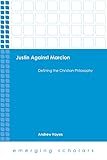Justin Against Marcion : defining the Christian philosophy / Andrew Hayes
Material type: TextSeries: Emerging scholarsPublisher: Minneapolis : Fortress Press, [2017]Description: xxxiv, 236 pages ; 24 cmContent type:
TextSeries: Emerging scholarsPublisher: Minneapolis : Fortress Press, [2017]Description: xxxiv, 236 pages ; 24 cmContent type: - text
- unmediated
- volume
- 9781506423449
- 1506423442
- 189.2 23 H4172
- B675.Z7 H39 2017
| Item type | Current library | Call number | Status | Date due | Barcode |
|---|---|---|---|---|---|
 Books
Books
|
New Theological College General Stacks | 189.2 H4172 (Browse shelf(Opens below)) | Available | 00031761 |
Revision of the author's thesis (Ph. D.)--King's College London, 2015 under title: Defining Christianity : Justin's contra-Marcionite defence
Includes bibliographical references (pages 221-231) and indexes
1. Who Are the "Christians"? -- Persecution -- Greco-Roman Perspectives -- Teacher and Pupils -- 2. Reading between the Lines: The Conspicuousness of Marcion in the Dialogue -- The Dialogue: Introduction and Commentary -- Repetition of Themes in the Dialogue -- Philosophies and "Christians" -- Conclusion -- 3. Case by Case -- Introduction -- Politics -- Who Are the Atheists? -- Evidence of True Worship -- Different Teacher, Different Confession -- Conclusion
In a period where Christianity was only beginning to form a definitive identity, Marcion played a remarkable and generative role. Andrew Hayes takes the measure of his impact on second-century Christianity through a close examination of the topics and structure of Justin Martyr's writings, especially the Dialogue with Trypho, demonstrating that Justin repeatedly described Christianity in a contra-Marcionite fashion. Arguing that the early part of the Dialogue is in fact a contra- Marcionite prelude to all the major themes in the rest of the piece, Hayes claims that the chief task Justin took for himself was to seize back from Marcion the terms of Christian self-definition. Marcion is thus far more important for Justin's work than the few places where he is explicitly named might suggest, and Hayes shows that these texts are far from anomalous: they reveal Justin's deeper agenda of presenting Marcion as a demonic instrument. Students of the second century, of Marcion and of Justin alike, will find much to reevaluate in these pages


There are no comments on this title.